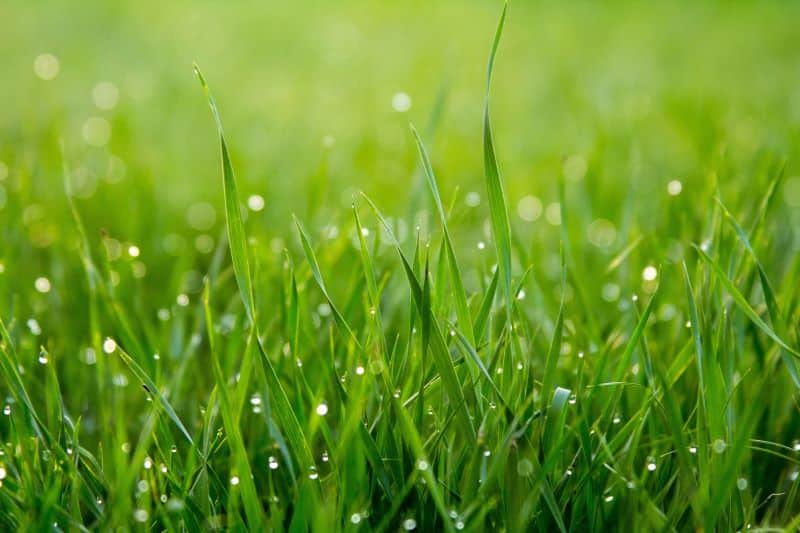
Michigan is a state with a diverse climate, ranging from hot and humid summers to cold and snowy winters. This means that not all grass types can thrive in Michigan’s soil and weather conditions. If you want to have a lush and green lawn in Michigan, you need to choose the best grass seed for your lawn’s needs and preferences.
We will review some of the best grass seed options for Michigan lawns, as well as some tips on how to plant and care for them. Whether you are looking for a grass seed that can handle high traffic, shade, drought, or sandy soil, we have you covered.
Best Grass Seed Types for Michigan Lawns
Michigan is located in the cool-season zone of the United States, which means that cool-season grasses are the most suitable for its climate. Cool-season grasses grow best in the spring and fall, when the temperatures are between 65 to 70 degrees Fahrenheit and the rainfall is plentiful. They can also tolerate the cold winters and the occasional summer heat waves.
Some of the most popular cool-season grasses for Michigan lawns are:
- Kentucky bluegrass: This is the most widely grown grass in Michigan, thanks to its fast growth, fine texture, dark green color, and durability. Kentucky bluegrass can form a dense and resilient turf that can withstand high traffic, drought, and diseases. It prefers well-drained, fertile soil with a pH range of 6.0-7.0, and at least 4-6 hours of direct sunlight per day. The optimal mowing height for Kentucky bluegrass is 1 ½ to 2 ½ inches.
- Perennial ryegrass: This is another fast-growing and hardy grass that can complement Kentucky bluegrass in a seed blend. Perennial ryegrass has a coarse texture, a bright green color, and a high germination rate. It can handle heavy foot traffic, shade, and erosion. It adapts well to various soil types, but prefers a pH range of 5.5-7.5. It requires moderate to high amounts of sunlight and water. The optimal mowing height for perennial ryegrass is 1 ½ to 2 inches.
- Fine fescue: This is a group of grasses that include creeping red fescue, hard fescue, chewings fescue, and sheep fescue. Fine fescues have a fine texture, a dark green color, and a low growth habit. They are ideal for shady, low-maintenance, and low-fertility areas. They can tolerate drought, cold, and acidic soil. They prefer a pH range of 5.0-6.5, and partial to full shade. The optimal mowing height for fine fescues is 2 to 3 inches.
- Tall fescue: This is a coarse-textured grass that has a deep root system and a high tolerance for heat, drought, and wear. Tall fescue can form a thick and lush turf that can resist diseases and insects. It grows well in various soil types, but prefers a pH range of 5.5-7.5. It requires moderate amounts of sunlight and water. The optimal mowing height for tall fescue is 2 to 3 inches.
Keep in mind that most grass seed products consist of a blend of many different grass varieties as it results in a tougher and healthier lawn.
Best Grass Seed Products for Michigan Lawns
Now that you know the best grass seed types for Michigan lawns, you may wonder which products to buy from the market. There are many grass seed products available online or in local stores, but not all of them are of high quality or suitable for your lawn’s needs.
To help you narrow down your choices, we have selected some of the best grass seed products for Michigan lawns based on their features, ratings, reviews, and prices. Here are our top picks:
- Best Overall: Scotts Turf Builder Grass Seed Sun & Shade Mix. This is a versatile and reliable grass seed mix that contains Kentucky bluegrass, perennial ryegrass, and fine fescues. It can grow in full sun or dense shade areas, and it has a WaterSmart Plus coating that helps absorb water and protect against diseases. It also has Scotts’ exclusive 4 in 1 WaterSmart Plus coating technology that helps absorb water faster than uncoated seeds.
- Best Bang for the Buck: Pennington Smart Seed Sun and Shade Grass Seed Mix. This is an affordable and eco-friendly grass seed mix that contains Kentucky bluegrass, perennial ryegrass, fine fescues, and annual ryegrass. It can grow in sunny or shady areas, and it has a Penkoted coating that enhances germination and protects against diseases. It also uses up to 30% less water than ordinary grass seeds thanks to its Pure Seed Technology.
- Best for High-Traffic Lawn: Scotts Turf Builder Grass Seed Kentucky Bluegrass Mix. This is a premium and durable grass seed mix that contains 100% Kentucky bluegrass. It can create a thick and resilient turf that can withstand high traffic, drought, and diseases. It has a WaterSmart Plus coating that helps absorb water and protect against diseases. It also has Scotts’ exclusive 4 in 1 WaterSmart Plus coating technology that helps absorb water faster than uncoated seeds.
- Best for Shady Lawn: Pennington Smart Seed Dense Shade Grass Seed Mix. This is a specialized and low-maintenance grass seed mix that contains fine fescues, perennial ryegrass, and Kentucky bluegrass. It can grow in areas with as little as 2 to 4 hours of sunlight per day, and it has a Penkoted coating that enhances germination and protects against diseases. It also uses up to 30% less water than ordinary grass seeds thanks to its Pure Seed Technology.
- Best for Lawn Thickening: Scotts Turf Builder Thick’R Lawn Tall Fescue Mix. This is a 3-in-1 solution that contains tall fescue grass seed, fertilizer, and soil improver. It can fill in bare spots, thicken existing grass, and improve soil quality. It has a WaterSmart Plus coating that helps absorb water and protect against diseases. It also has Scotts’ exclusive 4 in 1 WaterSmart Plus coating technology that helps absorb water faster than uncoated seeds.
- Best Drought-Tolerant: Jonathan Green Black Beauty Original Grass Seed. This is a high-quality and drought-tolerant grass seed mix that contains tall fescue, Kentucky bluegrass, and perennial ryegrass. It can create a dark green and uniform turf that can resist heat, drought, insects, and diseases. It has a natural waxy coating that helps retain moisture and protect against stress. It also has an invisible barrier that prevents crabgrass and weeds from germinating.
When to Plant Grass Seed in Michigan
Michigan is a state with four distinct seasons and a variety of grass types that can thrive in its climate. However, planting grass seed in Michigan requires some planning and timing to ensure the best results. Here are some tips on when and how to plant grass seed in Michigan.
The Best Time to Plant Grass Seed in Michigan
The best time to plant grass seed in Michigan depends on the type of grass you want to grow and the region you live in. Generally, the best time to plant grass seed is during the spring or fall when temperatures are moderate and rainfall is consistent.
When planting grass seed in the spring, it is ideal to plant after the last frost date. Refer to the following Zone map created by Gilmour.com to find out what growing zone you reside in. Michigan final frost dates are typically:
- Zone 4: Around May 12th
- Zone 5: Around April 30th
- Zone 6: Around April 21st
In the fall, plant grass seed between late August and late September. This gives the grass seed enough time to germinate and establish roots before the winter.
How to Plant and Care for Grass Seed in Michigan
After choosing the best grass seed for your Michigan lawn, you need to follow some steps to ensure successful planting and growth. Here are some general tips on how to plant and care for grass seed in Michigan:
- Prepare the soil: Before planting the grass seed, you need to prepare the soil by removing any weeds, rocks, debris, or old grass. You also need to loosen the top 6 inches of soil with a rake or a tiller, and add some organic matter or compost if needed. You can also test the soil pH and adjust it with lime or sulfur if necessary.
- Spread the seed: After preparing the soil, you need to spread the seed evenly over the area using a broadcast spreader or a hand spreader. You can follow the recommended seeding rate on the product label or use about 3 to 5 pounds of seed per 1,000 square feet. You can also mix the seed with some sand or sawdust to help distribute it more evenly.
- Cover the seed: After spreading the seed, you need to cover it lightly with some straw, peat moss, or mulch to help retain moisture and protect it from birds. You can also use a roller or a rake to press the seed into the soil for better contact.
- Water the seed: After covering the seed, you need to water it gently and frequently to keep the soil moist but not soggy. You can use a sprinkler or a hose with a fine spray nozzle to avoid washing away the seed. You can water the seed two to three times a day for the first two weeks, then reduce the frequency as the grass grows.
- Mow the grass: After the grass reaches about 3 inches tall, you can start mowing it with a sharp blade at the recommended height for your grass type. You can mow the grass once a week or as needed to maintain its health and appearance. You can also leave some clippings on the lawn to act as natural fertilizer.
- Fertilize the grass: Once the grass is established, you can fertilize it with a balanced fertilizer that contains nitrogen, phosphorus, and potassium. You can follow the instructions on the product label or use about 1 pound of nitrogen per 1,000 square feet every four to six weeks during the growing season. You can also apply a winterizer fertilizer in late fall to help the grass survive the winter.
Conclusion
Choosing the best grass seed for Michigan lawns is not hard if you know what to look for. By considering your lawn’s needs and preferences, as well as the climate and soil conditions of Michigan, you can find the best grass seed type and product for your lawn.
Photo by Ochir-Erdene Oyunmedeg on Unsplash
